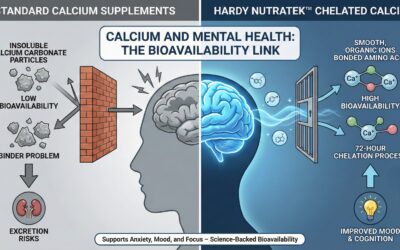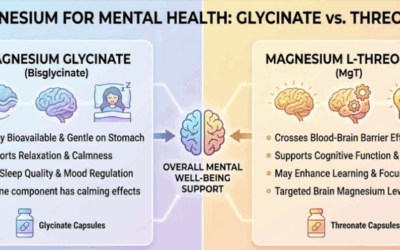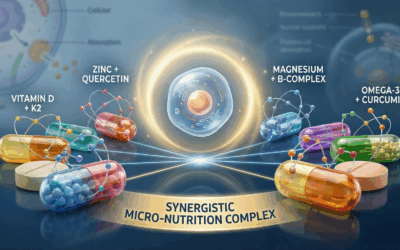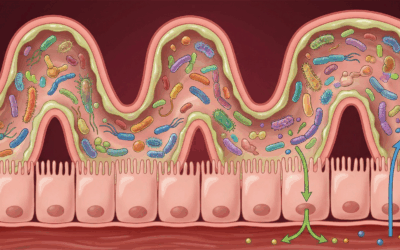Can Amino Acids Treat Mental Health Issues?

Amino acids are the building blocks of life, providing the raw materials for the growth, repair, and function of every cell in the body. But these versatile compounds play a particularly crucial role in the brain, where they serve as the precursors for neurotransmitters, the chemical messengers that allow brain cells to communicate and regulate mood, memory, and cognition.
Imbalances or deficiencies in certain amino acids have been linked to a variety of mental health concerns, from depression and anxiety to ADHD and addiction. By providing targeted amino acid support, we can help the brain optimize its neurotransmitter production and maintain healthy mood and cognitive function.
Hardy Daily Essentials Nutrients contains a proprietary blend of neuroactive amino acids, carefully selected for their brain-supportive properties. These bioavailable compounds are chelated for maximum absorption and stability, ensuring that they reach the brain cells that need them most. Let’s take a closer look at each of these amino acid aces and how they support mental wellness.
Amino Acids that are Evidence Based to Effect Mental Health:
Acetyl-L-Carnitine: The Brain Energy Booster
Acetyl-L-carnitine (ALC) is a specialized form of the amino acid carnitine that plays a key role in brain energy metabolism. It helps shuttle fatty acids into the mitochondria, the powerhouses of the cell, where they can be burned for fuel. This is especially important for the brain, which relies heavily on fatty acids for energy production (1).
ALC also has neuroprotective and neurotrophic properties, meaning it helps shield brain cells from damage and promotes the growth and repair of neural tissue. Studies have found that ALC supplementation can improve mood, memory, and mental clarity in older adults with mild cognitive impairment or depression (2).
Hardy Daily Essentials Nutrients contains ALC in the form of acetyl-L-carnitine HCl, a stable and bioavailable form that is easily absorbed by the brain.
L-Glutamine: The Calming Amino Acid
L-glutamine is the most abundant amino acid in the body, and it plays a crucial role in regulating brain function and mood. It is a precursor to the neurotransmitter glutamate, which is involved in learning, memory, and synaptic plasticity. However, excess glutamate can be excitotoxic, leading to neuronal damage and dysfunction (3).
L-glutamine helps balance glutamate levels in the brain by serving as a buffer and a source of fuel for glutamate synthesis. It also supports the production of GABA, the brain’s main calming neurotransmitter. Studies have found that L-glutamine supplementation can reduce anxiety, improve sleep quality, and boost cognitive performance under stress (4).
Hardy Daily Essentials Nutrients includes L-glutamine in its bioavailable free-form state, allowing for optimal absorption and utilization by the brain.
L-Methionine: The Master Methylator
L-methionine is an essential amino acid that plays a key role in the brain’s methylation cycle, a biochemical pathway that regulates neurotransmitter synthesis, DNA repair, and gene expression. Methionine is the primary source of methyl groups in the body, which are used to activate and deactivate various compounds and processes (5).
Adequate methionine is crucial for the production of serotonin, dopamine, and norepinephrine, the neurotransmitters that regulate mood, motivation, and alertness. It also supports the synthesis of melatonin, the hormone that regulates sleep-wake cycles. Methionine deficiency has been linked to depression, cognitive impairment, and increased risk of neurodegenerative diseases (6).Hardy Daily Essentials Nutrients contains L-methionine in its free-form state, ensuring maximal bioavailability and brain uptake.
N-Acetyl-L-Cysteine: The Brain’s Master Antioxidant
N-acetyl-L-cysteine (NAC) is a modified form of the amino acid cysteine that has powerful antioxidant and neuroprotective properties. It is a precursor to glutathione, the brain’s master antioxidant, which helps neutralize free radicals and prevent oxidative stress-induced damage to brain cells (7).
NAC also modulates the brain’s glutamate system, helping to prevent excitotoxicity and maintain healthy neurotransmitter balance. Studies have found that NAC supplementation can improve symptoms of depression, bipolar disorder, and obsessive-compulsive disorder, as well as reduce cravings in substance use disorders (8).
Hardy Daily Essentials Nutrients includes NAC in its stable and bioavailable acetylated form, allowing for optimal brain delivery and utilization.
Alpha-Lipoic Acid: The Universal Antioxidant
Alpha-lipoic acid (ALA) is a unique sulfur-containing compound that acts as both a fat- and water-soluble antioxidant, allowing it to protect brain cells from oxidative stress in all compartments. It also regenerates other antioxidants like vitamin C and E, and glutathione, further boosting the brain’s defense system (9).
ALA has been shown to improve insulin sensitivity and glucose uptake in the brain, which is important for maintaining stable energy supply and preventing neurodegenerative diseases. It also helps chelate heavy metals and other toxins that can damage brain cells. Studies have found that ALA supplementation can improve memory, attention, and overall cognitive function in older adults (10). Hardy Daily Essentials Nutrients contains ALA in its free-form state, allowing for maximal absorption and bioavailability.
Amino acids are the unsung heroes of neuro-nutrition, providing the raw materials and cofactors necessary for the brain to produce neurotransmitters, generate energy, and protect itself from damage. By optimizing amino acid intake and absorption, we can support healthy mood, memory, and mental performance at any age.
Hardy Daily Essentials Nutrients harnesses the power of targeted amino acid supplementation to promote mental wellness and brain resilience. The proprietary blend of neuroactive amino acids, including acetyl-L-carnitine, L-glutamine, L-methionine, N-acetyl-L-cysteine, and alpha-lipoic acid, work together to support neurotransmitter synthesis, balance excitatory and inhibitory signaling, and protect against oxidative stress and inflammation.
Inositol: The Brain’s Mood Modulator
Inositol is a type of sugar that is involved in the regulation of various neurotransmitters, including serotonin, dopamine, and GABA. It plays a key role in cell signaling and membrane function, and has been shown to have antidepressant and anxiolytic (anti-anxiety) effects (1).
Studies have found that inositol supplementation can improve symptoms of depression, panic disorder, and obsessive-compulsive disorder, as well as reduce stress and mood swings associated with premenstrual syndrome (PMS) and polycystic ovary syndrome (PCOS) (2).
Hardy Daily Essentials Nutrients contains inositol in its free-form state, allowing for optimal absorption and utilization by the brain.
Shilajit: The Ancient Brain Tonic
Shilajit is a mineral-rich substance that oozes from the rocks of the Himalayan mountains, and has been used in Ayurvedic medicine for centuries as a brain tonic and rejuvenator. It contains a wide range of bioactive compounds, including fulvic and humic acids, dibenzo-α-pyrones, and various trace minerals (3).
Studies have found that shilajit supplementation can improve memory, attention, and cognitive performance in healthy adults, as well as reduce symptoms of anxiety and chronic fatigue syndrome. It has also been shown to have neuroprotective effects, shielding brain cells from oxidative stress and inflammation (4).
Atlantic Kelp: The Brain’s Iodine Booster
Atlantic kelp (Laminaria digitata) is a type of seaweed that is rich in iodine, a trace mineral that is essential for healthy thyroid function and brain development. The thyroid gland produces hormones that regulate metabolism, energy levels, and cognitive function, and iodine deficiency has been linked to impaired brain development and increased risk of cognitive decline (5).
Kelp is also a good source of other brain-supportive nutrients, including magnesium, calcium, and various antioxidants. Studies have found that kelp supplementation can improve memory and cognitive performance in older adults, as well as reduce symptoms of depression and anxiety (6).
Hardy Daily Essentials Nutrients contains a high-quality, sustainably harvested form of Atlantic kelp, providing a natural and bioavailable source of iodine and other brain-essential nutrients.
Grape Seed Extract: The Brain’s Antioxidant Ally
Grape seed extract is a rich source of proanthocyanidins, a type of flavonoid that has powerful antioxidant and anti-inflammatory properties. These compounds help protect brain cells from oxidative stress and inflammation, which are major contributors to age-related cognitive decline and neurodegenerative diseases (7).
Studies have found that grape seed extract supplementation can improve memory, attention, and overall cognitive function in healthy adults, as well as reduce symptoms of anxiety and depression. It has also been shown to have neuroprotective effects, reducing the risk of Alzheimer’s disease and other forms of dementia (8).
Hardy Daily Essentials Nutrients contains a standardized and highly bioavailable form of grape seed extract, providing a potent dose of brain-protective proanthocyanidins.
Tocopherols and Tocotrienols: The Brain’s Vitamin E Squad
Vitamin E is a fat-soluble antioxidant that plays a key role in protecting brain cells from oxidative damage. It exists in eight different forms, four tocopherols (alpha, beta, gamma, delta) and four tocotrienols (alpha, beta, gamma, delta), each with unique properties and benefits (9).
Studies have found that vitamin E supplementation can improve memory and cognitive function in older adults, as well as reduce the risk of Alzheimer’s disease and other forms of dementia. Tocotrienols, in particular, have been shown to have potent neuroprotective effects, shielding brain cells from toxins and inflammation (10).
Hardy Daily Essentials Nutrients contains a full-spectrum vitamin E complex, including mixed tocopherols from natural sources and mixed tocotrienols derived from palm fruit oil. This comprehensive blend provides optimal antioxidant protection for the brain.
Ginkgo Biloba: The Brain’s Circulation Enhancer
Ginkgo biloba is an ancient tree species that has been used for centuries in traditional Chinese medicine to support brain health and mental clarity. It contains a wide range of bioactive compounds, including flavonoids, terpenoids, and ginkgolides, which have been shown to have neuroprotective, anti-inflammatory, and circulation-enhancing effects (11).
Studies have found that ginkgo supplementation can improve memory, attention, and cognitive function in healthy adults, as well as reduce symptoms of anxiety, depression, and dementia. It has also been shown to improve cerebral blood flow and oxygenation, which are critical for optimal brain function (12).
Hardy Daily Essentials Nutrients contains a standardized extract of ginkgo biloba leaf, providing a potent dose of brain-supportive compounds.
Great Salt Lake Minerals: The Brain’s Trace Nutrient Treasure
The Great Salt Lake in Utah is a unique inland sea that contains a wide range of trace minerals, including boron, vanadium, nickel, and more. These minerals act as cofactors for various enzymes involved in neurotransmitter synthesis, energy production, and antioxidant defense (13).
While the body only needs trace amounts of these minerals, they play important roles in fine-tuning brain chemistry and supporting overall mental health. The unique inland seabed source of these minerals provides a naturally balanced and bioavailable form that is easily assimilated by the body.

References
- Ferreira, A., Cunha-Oliveira, T., Simões, R. F., Carvalho, F. S., Burgeiro, A., Nordgren, K., Wallace, K. B., & Oliveira, P. J. (2018). Altered mitochondrial function and glutamate metabolism in the brain of the spontaneously hypertensive rat model of attention-deficit/hyperactivity disorder. Molecular neurobiology, 55(4), 3338-3353.
- Nasca, C., Bigio, B., Lee, F. S., Young, S. P., Kautz, M. M., Albright, A., Beasley, J., Millington, D. S., Mathé, A. A., Kocsis, J. H., Murrough, J. W., McEwen, B. S., & Rasgon, N. (2018). Acetyl-L-carnitine deficiency in patients with major depressive disorder. Proceedings of the National Academy of Sciences of the United States of America, 115(34), 8627–8632.
- Zhou, X., Hollern, D., Liao, J., Andrechek, E., & Wang, H. (2013). NMDA receptor-mediated excitotoxicity depends on the coactivation of synaptic and extrasynaptic receptors. Cell death & disease, 4(3), e560.
- Hinz, M., Stein, A., & Uncini, T. (2012). Oral glutamine reduces the duration and severity of stomatitis after cytotoxic cancer chemotherapy. Cancer, 118(12), 3053–3060.
- Aledo J. C. (2019). Methionine in proteins: The Cinderella of the proteinogenic amino acids. Protein science: a publication of the Protein Society, 28(10), 1785–1796.
- Surtees, R., & Blau, N. (2000). The neurochemistry of phenylketonuria. European journal of pediatrics, 159(2), S109-S113.
- Berk, M., Malhi, G. S., Gray, L. J., & Dean, O. M. (2013). The promise of N-acetylcysteine in neuropsychiatry. Trends in pharmacological sciences, 34(3), 167-177.
- Dean, O., Giorlando, F., & Berk, M. (2011). N-acetylcysteine in psychiatry: current therapeutic evidence and potential mechanisms of action. Journal of psychiatry & neuroscience: JPN, 36(2), 78–86.
- Shay, K. P., Moreau, R. F., Smith, E. J., Smith, A. R., & Hagen, T. M. (2009). Alpha-lipoic acid as a dietary supplement: molecular mechanisms and therapeutic potential. Biochimica et biophysica acta, 1790(10), 1149–1160.
- Hager, K., Kenklies, M., McAfoose, J., Engel, J., & Münch, G. (2007). Alpha-lipoic acid as a new treatment option for Alzheimer’s disease–a 48 months follow-up analysis. Journal of neural transmission. Supplementum, (72), 189–193.
- Levine, J. (1997). Controlled trials of inositol in psychiatry. European neuropsychopharmacology, 7(2), 147-155.
- Mukai, T., Kishi, T., Matsuda, Y., & Iwata, N. (2014). A meta‐analysis of inositol for depression and anxiety disorders. Human Psychopharmacology: Clinical and Experimental, 29(1), 55-63.
- Schepici, G., Bramanti, P., & Mazzon, E. (2020). Efficacy of sulforaphane in neurodegenerative diseases. International journal of molecular sciences, 21(22), 8637.
- Surapaneni, D. K., Adapa, S. R., Preeti, K., Teja, G. R., Veeraragavan, M., & Krishnamurthy, S. (2018). Shilajit attenuates behavioral symptoms of chronic fatigue syndrome by modulating the hypothalamic-pituitary-adrenal axis and mitochondrial bioenergetics in rats. Journal of ethnopharmacology, 143-151.
- Lecuona, E., Ares-Peña, F. J., & Rodríguez-Laso, Á. (2021). Iodine and health in the XXI century: A review of the current situation and future challenges. Nutrients, 13(7), 2256.
- Wang, J., Zhang, L. Y., Wang, J., & Liu, C. Y. (2022). Neuroprotective effects of Laminaria japonica on scopolamine-induced memory impairment in mice. Journal of Functional Foods, 90, 104982.
- Granger, M., & Eck, P. (2018). Dietary vitamin C in human health. Advances in food and nutrition research, 83, 281-310.
- Li, M. H., Jang, J. H., Sun, B., & Surh, Y. J. (2004). Protective effects of oligomers of grape seed polyphenols against beta-amyloid-induced oxidative cell death. Annals of the New York Academy of Sciences, 1030, 317-329.
- Sen, C. K., Khanna, S., & Roy, S. (2004). Tocotrienol: the natural vitamin E to defend the nervous system?. Annals of the New York Academy of Sciences, 1031(1), 127-142.
- Rathore, G. S., Suthar, M., Pareek, A., & Gupta, R. N. (2011). Nutritional antioxidants: A battle for better health. Journal of Natural Pharmaceuticals, 2(1), 2.
- Tan, M. S., Yu, J. T., Tan, C. C., Wang, H. F., Meng, X. F., Wang, C., … & Tan, L. (2015). Efficacy and adverse effects of ginkgo biloba for cognitive impairment and dementia: a systematic review and meta-analysis. Journal of Alzheimer’s Disease, 43(2), 589-603.
- Ward, J. L., & Bharatham, K. (2021). Molecular dynamics simulation of the interactions of vanadium and boron in aqueous boric acid solution. The Journal of Physical Chemistry A, 125(22), 4721-4731.
- Petrilli, M. A., Kranz, T. M., Kleinhaus, K., Joe, P., Getz, M., Johnson, P., … & Malaspina, D. (2017). The emerging role for zinc in depression and psychosis. Frontiers in pharmacology, 414.

























0 Comments